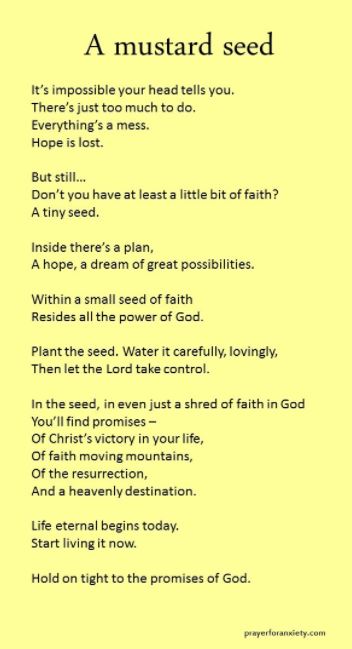Jesus was a teacher – he showed others how to see the world in a different way
This week’s Gospel is a wonderful example of the teaching style of Jesus. It even tells us that ‘he would not speak to them except in parables’. Jesus used the parable form almost exclusively to share his message. He used imagery that was familiar to his audience; parables about the everyday life of a rural community involving seeds, planting, growing and harvesting. The secret of Jesus’ parables, when we understand the cultural context, is that there was always a ‘twist in the tale’ – what is called a ‘discombobulating shift’ – that turns the expected outcome of the story on its head.
Hidden meanings
This is nowhere more evident than in the image of the mustard seed. On the surface, the parable is about the Kingdom of God starting from very small, humble beginnings and growing into something great. However, immediately prior to this kingdom parable, Jesus reminded us that the community makes a living out of growing grain crops like wheat for bread, etc. His parable about the mustard seed describes a tiny seed that grows into a great shrub, ‘so that the birds of the air can shelter in its shade’. A farming community that was growing grain crops would be greatly alarmed at the thought of actually attracting birds to their fields or even nearby. Jesus’ message about the Kingdom of God is that it is actually disruptive and invasive. The kingdom brings unrest and disquiet to the predictable. The Kingdom of God is unsettling and it should be! This is a much more challenging parable than it appears from a literal reading.
The references to the Kingdom of God in the gospels always carry a paradox. It exists in the present, yet is something to be achieved in the future. It is here, but not yet. If we live ‘as if’ we are living in the kingdom here and now, then we hasten its coming. The Kingdom of God is not a place but a way in which the world operates. It is a kingdom that is ruled by justice and gives precedence to those who are regarded as nothing in the world. It is a kingdom of promise and hope that inspires and calls all people to more than they currently are.
Teaching through analogy
Jesus sought to describe the Kingdom of God by comparison and analogy – ‘The Kingdom of God is like … ’; ‘To what can we compare the kingdom of God?’ He never gave a lecture about the kingdom, rather, he painted a picture in terms that were readily recognised by his audience but forced them to think differently about the image he used. It forced them to think about themselves and their world in a different way. Kingdom parables begin innocently enough with a familiar image but very quickly shift to a challenge about the way we normally perceive things. The kingdom is often portrayed as a contradiction.
The first parable in the Gospel passage describes the unerring work of the kingdom. It is like the seed that almost magically transforms into a fully grown plant that may be harvested – apparently without any external forces. Of course, we know that plants need to be fed, watered, weeded and nurtured to ensure their proper growth. However, the Kingdom of God works in our lives in a similar way – if we feed and nurture it, the kingdom will produce a great harvest. Even if we don’t pay it attention, the kingdom is present and acting in our world.
Let us work to feed and nurture the Kingdom of Heaven – in our actions and our words. In the way that we deal with others, in our own personal interactions and our personal integrity.
Prayer for this week


